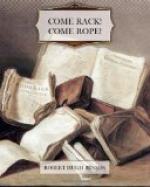* * * * *
Then, without sound or warning, except for the footsteps on the paving-stones and the sudden darkening of the sunshine on the floor, there came the figure for which all looked. As he entered he lifted his hand to his head, but dropped it again; and passed on, sturdy, and (you would have said) honest and resolute too, to his seat behind the reading-desk. He was met by silence; he was escorted by silence; and in silence he sat down.
Then the waiting crowd surged in, poured this way and that, and flowed into the benches. And Mr. Barton’s voice was raised in holy exhortation.
“At what time soever a sinner doth repent him of his sin from the bottom of his heart, I will put all his wickedness out of remembrance, with the Lord.”
III
Those who could best observe (for the tale was handed on with the careful accuracy of those who cannot read or write) professed themselves amazed at the assured ease of the squire. No sound came from the seat half-hidden behind the reading-desk where he sat alone; and, during the prayers when he stood or kneeled, he moved as if he understood well enough what he was at. A great bound Prayer-Book, it was known, rested before him on the book-board, and he was observed to turn the pages more than once.
It was, indeed, a heavy task that Mr. Barton had to do. For first there was the morning prayer, with its psalms, its lessons and its prayers; next the Litany, and last the communion, in the course of which was delivered one of the homilies set forth by authority, especially designed for the support of those who were no preachers—preceded and followed by a psalm. But all was easy to-day to a man who had such cause for exultation; his voice boomed heartily out; his face radiated his pleasure; and he delivered his homily when the time came, with excellent emphasis and power—all from the reading-desk, except the communion.
Yet it is to be doubted whether the attention of those that heard him was where their pastor would have desired it to be; since even to these country-folk the drama of the whole was evident. There, seen full when he sat down, and in part when he kneeled and stood, was the man who hitherto had stood to them for the old order, the old faith, the old tradition—the man whose horse’s footsteps had been heard, times and again, before dawn, in the village street, bearing him to the mystery of the mass; through whose gate strangers had ridden, perhaps three or four times in the year, to find harbourage—strangers dressed indeed as plain gentlemen or yeomen, yet known, every one of them, to be under her Grace’s ban, and to ride in peril of liberty if not of life.
Yet here he sat—a man feared and even loved by some—the first of his line to yield to circumstance, and to make peace with his times. Not a man of all who looked on him believed him certainly to be that which his actions professed him to be; some doubted, especially those who themselves inclined to the old ways or secretly followed them; and the hearts of these grew sick as they watched.




